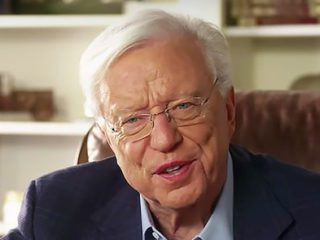Mike and Harriet, please tell us about “Marriage Savers” and just what exactly that is.
[Mike McManus] This is a ministry that grew out of the book Marriage Savers. Our purpose is to help couples prepare for a life-long marriage, strengthen existing marriages, save the troubled ones, help the separator reconcile, and enable step-families who have children from a previous marriage to be successful. Those are our five goals.I’ve been writing a column called “Epics of Religion” for more than 20 years. I’ve had a chance to travel this country and look at the best things that are out there to either help people that are at one or another of these different stages of the marital life-cycle. What we have done is to put these under this umbrella we call “Marriage Savers” and we train couples to be mentoring couples. We have found that some churches have been able to reduce their divorce rate to almost zero.
On our web site, MarriageSavers.org, we have a little link there to five churches that between them have only six divorces in four to six years. That’s about one divorce per church in a very long time. So it’s a virtual elimination of divorce in the local church. That’s our goal for any individual congregation. We have been able to cut the divorce rate as much as 50% in some cities that have adopted what we call a “Community Marriage Policy” in which a number of churches pledge to take these steps together.
[Harriet McManus] The key ingredient is what we call the “Mentor Couple”. This is an age-old scripturally based concept. It’s not so much discipling, but it really is the mentoring — of walking alongside — another couple, two by two. These couples obviously are not paid, these are not licensed therapists nor are they ordained pastors. But they are married couples who do have something to offer other couples at any one of these 5 marital life-phases. These are not couples that tell other couples what to do, but they certainly can testify to what they did and what they didn’t do correctly. So it’s a wonderful gift to give another couple. In fact, there have been some studies done where volunteer mentor couples had an 80 or 85% or more success rate dealing with couples that are currently in crisis. [Mike McManus]Every church has got couples who have been through adultery. And they’ve just never been looked upon as a resource by the pastor to couples who are in current crisis because of adultery. We train those couples who had pain in their past — who’ve stepped back from the brink of divorce and saved their marriage — to tell their stories to the couples who are in current crisis. We can save, as Harriet said, about 4 out of 5 of the worst marriages that way. Whereas therapists save only about 20% or less.Would that mean then that this success is because the mentors may have gone through that scenario with their own marriage?
[Mike McManus] Well, the reason marriages fail, if you had to summarize it in one word, would be selfishness. And the main reason the best marriages work is selflessness. And the question is how do you move people from selfishness to selflessness? Therapy isn’t aimed to do that, it’s aimed to help the person talk through why they were doing this and what their backgrounds were and what was their family and their mother, all that kind of stuff. What really matters is “What are you going to do tomorrow with this man that you married, or this woman that you married to try to make this marriage work?” And we think the best teachers are people who have “been there, done that”. The people who have come out of selfishness and moved to selflessness. They can witness to what’s happened in their own life in a way that’s sort of analogous to Alcoholics Anonymous.Now the intervention for step-families is quite different from the one-to-one mentoring that we’ve been describing and the best thing that we’ve seen work here came out of Roswell United Methodist Church, near Atlanta. They created what they call a “step-family support group” and this does work more like AA because there’s not individual therapy. You go to a meeting with other couples who have step-children and learn from them how to make this kind of marriage work, which is a very tough marriage to make work. But the intervention is different. And so what we do at “Marriage Savers” is train churches how to launch each of these different ministries at these different stages of marital life-cycle.
Now, you have talked about the marriages themselves, but really it’s not just about stopping divorce. You’ve written about how the true goal might be changing a culture so that marriage is considered — even revered — as a permanent relationship. Can you explain that a little bit?
[Mike McManus] In Madison, Wisconsin last spring we had 60 churches sign a “Community Marriage Policy” that they would no longer do “quickie” weddings. They would require at least 4 months of marriage preparation for any couple getting married. Part of that preparation would involve taking a pre-marital inventory that we trained older couples to administer. And they pledged as well to do at least one annual event to enrich the existing marriages in their own congregations. They pledged to train couples whose marriages had once nearly failed to come alongside those in current crisis, to provide a course called “Reconciling God’s Way”, and to create step-family support groups in the community. These five different interventions were agreed to by about 60 pastors. But we had the signing of this covenant under the dome of the state capitol. The Lieutenant Governor spoke, the Speaker of the Assembly spoke, the Governor sent a message. The politicians said how wonderful it was that the clergy are taking responsibility for marriages and trying to help them work. They said, “We’ve spent hundreds of millions of dollars a year trying to pick up the pieces of broken marriages or non-marriages and what you’re doing is so wonderful”. That was covered by NBC, CBS, ABC and FOX affiliates there. It was the lead story on each of the network stations. And PBS flew a crew in.This “Community Marriage Policy” that we’re talking about is now very active in a number of communities. Is that correct?
[Mike McManus] Right, 173. [Harriet McManus] The mayor or the county clerk or the politicians in that particular community applaud this because they know all too well that a lot of our tax payers’ money is going to pay for school dropouts, unwed mothers, vandalism, crime — because we know that children of divorce are twice as likely to drop out of school, three times as likely to be cast into poverty, six times as likely to commit suicide, and twelve times as likely to be incarcerated. Even if we’re not church-goers in that particular community, our tax dollars are paying for the clean up of the devastation of the family.I know that Modesto, California has been a great model community for you in addition to some other towns. Can you tell us some of the success stories in those communities?
[Mike McManus] Well, Modesto was the first city in which I challenged the clergy to sign a “Community Marriage Policy” in 1986. And their divorce rate is down 57% now. There were 95 pastors, priests and 1 rabbi who signed the original agreement. And almost immediately, the divorce rate began going down. It dropped by about 1/3 in the first 4 or 5 years and then it started to go up again. Some of the pastors got involved in a prayer movement. They decided to go away for 4 days of prayer with no agenda but to pray for their churches, their community, themselves in 1994. And in 1995, twice as many pastors went. So what I’m saying is that “Marriage Savers” — this “Community Marriage Policy” idea — kind of lit the fuse and it has some result. But where it really took off was when the pastors themselves took additional steps to emphasize the importance of the vows of marriage and moved a number of men to live lives worthy of Christ.I’m hearing several facets of a successful “Community Marriage Policy”. And that is exposure, some sort of a staff that’s in place — whether it’s the clergy or volunteer — the training of mentors, a fully devoted commitment and passion to do this.
[Harriet McManus] It’s really a three-tiered effort in any community. One is the official, very public signing of a “Community Marriage Policy” where hopefully you get all the facets of the Christian community and the Jewish community, if they would like to come on board, together. And the second tier would be the “Marriage Savers” church, where they have adopted all of those five strategies that Mike was speaking of. And the lowest key is the mentoring couple.You have mentioned a “couples inventory”. You say there’s no better way for a couple to get an objective view of their strengths in areas of conflict than with a pre-marital inventory. What marriage survey would you recommend for engaged couples to take and why?
[Harriet McManus] We have looked at a number of different ones and many of them are excellent. For the purpose of mentoring — using a volunteer couple and assigning them to a seriously dating or engaged couple — we found that an inventory called “Focus” really best met our needs. And the reason we went with this particular inventory was we felt it was very “mentor friendly”. I think having gone through 9 years of trying to recruit potential mentoring couples, the first thing they say is “Oh my gosh, why did you call us, we don’t have a perfect marriage?” or “Who told you that I’m a counselor, I’m not. I never took psychology in college”. The nice thing about this particular inventory is it just sort of diffuses all of those arguments. [Mike McManus] They’re actually one-sentence statements. That’s what the inventory is. One of them is: “There are certain behaviors or habits my future spouse has which annoy me.” And a follow-up question says, “Can you live with this behavior for 40 years if there is no change? Can you recognize this tendency in yourself and resist it?” It sort of provides a cold shower with a little humor and it makes it easy for a lay couple to have an intelligent conversation with the mentorees. We have 16 exercises. We say, “There is a strategy that you can take today that would increase the odds of your marriage going the distance. And we assume you’d be interested in taking the step to at least consider the possibility of remaining chaste from now until the time of the wedding.” We carefully write out the text of this in the mentor’s guide to say, “We are not asking what your present level of physical involvement is, but we do want to make a case for chastity from now until the time of the wedding”. Harriet and I have mentored 45 couples now, and of those 45 couples only 4 were chaste at the time that they met with us. All the rest were sexually active. We think it’s important to make a case for chastity with these couples and we ask them to limit their physical involvement to no more than french kissing. Part of the agreement is that should they go over that line that they’d be willing to call us up within 24 hours. Many of them will say, “Well, we’re not going to sign that.” And we say, “Well, you think about it and pray about it and we’ll talk to you next time.”One particular couple said, “Well, we finally decided we’re going to sign this thing.” And I said “Wonderful”. The woman, who was about 40 and she was dating a man who was 51, said “I really appreciate your being persistent on this because it gives me a new sense of freedom in this relationship”. A month later they broke up. What she said was, “When the sex stopped I realized there was nothing else to this relationship.” And the sex is really blinding. It gives couples a sense of being close, of loving one another, when in fact it’s really lust. If you take the lust out of it, it helps the couples to build their relationships based on character.
[Harriet McManus] Also it’s very difficult to be helping a couple to learn communication and conflict resolution skills when they have a pattern of restoring a sense of intimacy after an argument by becoming sexually involved. This way, we ask them to set the sexuality expression aside and to really practice their new tools to be able to learn how to communicate in a very different, honoring, mature, respectful way.Is there anything else that you would like for our Marriagetrac viewers to know or to hear from you directly?
[Mike McManus] We would welcome the opportunity to work with any church that would like to create a “Community Marriage Policy” in their community. We have materials that tell them how to do this and we would coach them from the side and be a part of it and then we would be willing to come and train. We have regional directors in the south and in the mid-west who help us in this. And we would welcome the chance to come in and help bring down the divorce rate in any community and in any church. [Harriet McManus] I would cast an invitation out there to couples who are sitting on a mother load of wisdom, although they’re not quite aware of it. Couples that have a great deal — who have a good marriage and in fact their marriage might well have been not so good. They have an awful lot of wisdom and experience to speak to and they can help other couples that are currently in crisis. That they can use their marriage as a gift and as a tool for others and have them think of themselves as maybe becoming a mentor couple, starting a mentoring ministry in their own home church.Copyright © 2003 Marriagetrac. All rights reserved.
Michael and Harriet McManus founded MarriageSavers in 1996, a ministry that equips local communities, principally through local congregations, to help men and women to: Prepare for lifelong marriage, Strengthen existing marriages, and Restore troubled marriage. Read more about MarriageSavers at MarriageSavers.org.
Mike asked that we include the following additional information:
An independent Institute for Research and Evaluation has taken a look at 121 cities that adopted a CMP by 2000, to see whether they really did lower divorce rates. You may want to use one or more of these conclusions:
1. The divorce rates of counties with cities adopting Community Marriage Policies have fallen on average by 23.4% over a decade, when a three year average divorce rate before the CMP was signed is compared with 2001, and in comparison with three years after the CMP was signed, where at least three years have lapsed.
2. The divorce rate has plunged between 48% and 79.5% in eight cities that adopted CMPs: Modesto, the first city to sign a CMP in 1986, for example is down 57%, saving about 1,700 marriages a year that would have otherwise ended in divorce. Divorces have fallen much faster in more recent cities to sign on. In 1996, 252 Austin, TX pastors signed a CMP, and the divorce rate is down a striking 50%. El Paso and Kansas City, KS also signed in 1996. El Paso’s divorce rate has plummeted a stunning 79.5%, and in Kansas by 53% in one county and 63% in a second.
4. The Institute used a second yardstick, for measurement in addition to comparing the average divorce rate for three years before the CMP was adopted, with three years afterward. To be called successful, a city also had to outperform comparable cities in that state. The divorce rate of comparable cities fell 10.8% which compares to the 23.4% drop of 121 CMP cities. Thus, Community Marriage Policies more than doubled the decline of non-CMP cities
For example, Tallahassee’s divorce rate fell 12.9% through 2001 after signing a CMP in January, 1999. However, in that same time, some Florida counties without a CMP fell more than Tallahassee. Institute research revealed however, that cities which fell more all had an influx of Catholic populations, which do divorce at a lower rate than Protestants. When Tallahassee was compared with other northern Florida counties, with a similar Southern Baptist makeup, their divorce rates fell only 1.3% or one-tenth that of Leon County where Tallahassee is located. Its record is thus ten times better than comparable counties. A similar analysis has been made of all 144 cities, not all of which are similarly successful. But all have been subjected to this sort of rigorous analysis.
Copyright © Marriagetrac
[schemaapprating]


 Jim is the founder, with wife,
Jim is the founder, with wife, 







